Animal Welfare Updates: January - February 2022An Animal Welfare Nexus Resolution Adopted at the United Nations Environmental Assembly 5.2!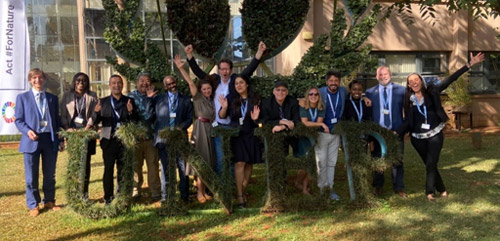
Animal Welfare Organizations Representatives Celebrate the Adoption of the Resolution. For the first time in history, a resolution that exclusively refers to animal welfare was adopted on March 2, 2022. The Resumed Fifth Session of the United Nations Environment Assembly (UNEA 5.2) adopted the Animal Welfare, Environment and Sustainable Development Nexus Resolution which was sponsored by seven (7) Member States, namely Ghana, Burkina Faso, Senegal, South Sudan, Ethiopia, the Democratic Republic of Congo, and the Islamic Republic of Pakistan. The draft resolution was discussed, negotiated, and was agreed upon at a referendum and was passed by Open Ended Committee of Permanent Representatives (OECPR) ahead of UNEA 5.2. This move follows the endorsement of the resolution by the Specialized Technical Committee (STC) in December 2021 of the African Union Commission (AUC) and the Heads of States and Government of African Union during the 35th African Union Summit in February 2022. The governments, institutions, and international organizations aligned with the resolution’s call on the Executive Director of the United Nations Environment Programme (UNEP) to produce a report in close collaboration with the Food and Agriculture Organization (FAO), World Health Organization (WHO), World Organization for Animal Health (OIE), the One-Health High-Level Expert Panel and other stakeholders. Efforts and activities that preceded this ground-breaking achievement stemmed from indigenous animal welfare groups in Africa in partnership with global like-minded organizations. The actions taken which aimed to derive support from Member States was coordinated by Africa Network for Animal Welfare (ANAW), African Union - Inter-African Bureau for Animal Resources (AU-IBAR) and the World Federation for Animals (WFA). The organizations collaborated with their partners and member organizations in Africa, Asia, Europe, and USA. The process was generously supported financially and in kind by Compassion in World Farming (CIWF), Four Paws, Royal Society for the Prevention of Cruelty to Animals (RSPCA), Animal People, Animal Welfare Trust, Africa Network for Animal Welfare-USA, American Anti-Vivisection Society (AAVS), Animals Australia, The Donkey Sanctuary, World Horse Welfare, and WellBeing International at a regional and global level. This major achievement had been long forthcoming for the animal welfare stakeholders and partners as the process of attaining it was focused, adept and efficient. “Today, the world’s highest-level decision-making body on the environment acknowledged the strong body of science supporting animal welfare and its contribution to the achievement of the Sustainable Development Goals. We have taken a bigger step forward to protect humans, animals, and the planet. And we showed how we are better together” said Josphat Ngonyo, the Founder and Executive Director for Africa Network for Animal Welfare (ANAW). You can Read the Press Release here Animal Welfare Club Member Calls for the Rescue of a Tortoise in Peril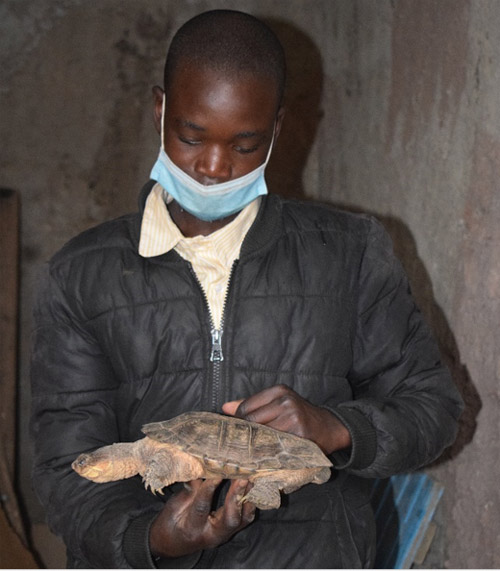
Animal Welfare Hero Andrew Siria of Emanson Academy in Nairobi, Lovingly Holds the Rescued Tortoise in his Hands. One of the patrons of the ANAW-supported Animal Welfare Clubs, Beatrice Oloo, from Emanson Academy alerted the ANAW rescue team about a tortoise that was found in an area full of trash, and drawing from the wealth of knowledge gained from the teachings of the clubs, the young club member, Andrew Siria reached out to the patron, and they both decided to have the stranded tortoise brought to the school, located along Ngong Road, Nairobi, for care and protection. The ANAW Team in conjunction with Kenya Society for the Protection and Care of Animals (KSPCA) swiftly intervened and rescued the female adult tortoise at the school on January 18, 2022. The tortoise appeared to be in a stable condition after the care given by the students. A decision was made for it to be taken for further examination and sheltered at the KSPCA. The team also met the children at the Animal Welfare Clubs and engaged them in an animal welfare talk. It was fulfilling to see the impact of the knowledge gained from the clubs being translated into action. This encouraging deed of service, positive attitude change towards animals and kindness to all animals is what ANAW teaches the students and communities who live with or close to animals – both domestic and wildlife. Wildlife Rescues and De-snaring Patrols Resume in Nakuru County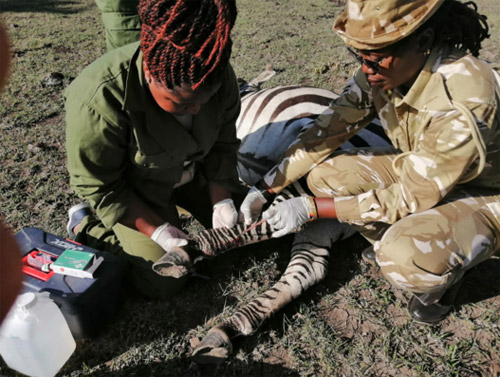
The ANAW and KWS Team Attend to a Zebra in Distress During a Rescue. Exploitation of natural resources is present in wildlife habitat and its environs with practices leading to deforestation to source livelihoods in neighboring communities. Several charcoal kilns were encountered and noted. This provided evidence that a lot of trees, most of which were the yellow-barked acacia species, were being cut down for charcoal purposes. In February, a de-snaring exercise was carried out at Kigio Conservancy, Marula Ranch and Soysambu Conservancy in Nakuru by Africa Network for Animal Welfare (ANAW) and Kenya Wildlife Society (KWS). Three (3) animals with live snare were rescued - one at Marula ranch and two (2) at Soysambu Conservancy. A total of 30 snares were lifted consisting of 28 live snares and two dead snares. The team received an emergency call to attend to a limping zebra, along the Naivasha Highway. Upon arrival, the zebra was identified as one that was previously rescued from a different ground snare. Unfortunately, its hoof broke off at the joint, exposing bone which caused it severe pain. A decision had to be made - to euthanize it. A total of seven (7) animals were attended to in February through the partnership of ANAW and KWS veterinarians. One zebra was put down, and six animals consisting of five zebras and one wildebeest were successfully rescued. Primates Continue to Receive Care and Protection in Ukunda, Kwale County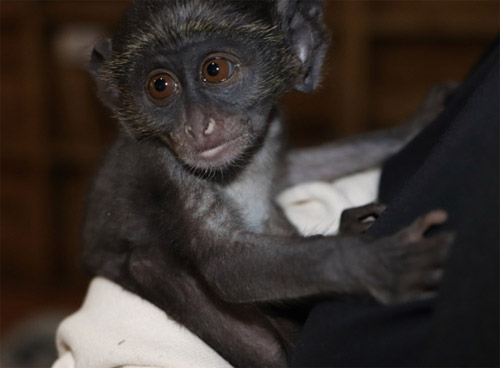
A Sykes Infant Rescued after Being Abandoned Near Diani Beach Hospital. Photo Courtesy of Colobus Conservation. The year began with multiple cases of primates requiring rescue at Colobus Conservation. Thirteen (13) animal welfare cases were attended to in January including five (5) Colobus, five (5) Sykes, two (2) Baboons and one (1) Bush Baby. The Baboons were treated and released back to the wild. In February, the center attended to 18 animal welfare cases, which consisted of seven (7) Sykes, two (2) Vervets, two (2) birds (African Wood Owl and King Fisher) two (2) Bush babies and five (5) Colobus. Two (2) orphaned infant Sykes and one (1) Vervet (pet) monkeys were taken in for long term rehabilitation where they will finally be released to the wild. “It is always fulfilling when I treat or give care to the primates. Eliminating pain and curing injury on the primates makes my day.” ANAW-based resident veterinary officer, Dr Erick Onsongo, said with a broad smile on his face. MEDIA PRACTITIONERS SENSITISED ON EFFECTS OF DONKEY CROSS-BORDER MOVEMENT AND TRADE DURING A MEDIA WORKSHOP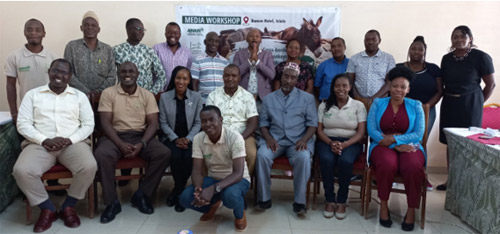
Picture Moments During the Media Stakeholder and Consultative Workshop on Donkey Cross-Border Movement and Trade, Bomen Hotel – Isiolo County. On February 21 to 22, 2022, ANAW in partnership with Welttierschutzgesellschaft e.V. (WTG) and the County government of Marsabit conducted a one-day media workshop in Isiolo town to highlight key findings of the project that commenced in January 2021. The workshop was held at Bomen Hotel, in Isiolo County, and was attended by over 20 media practitioners from both national and international media houses representing print (newspapers), electronic (Television and Radio) and web media (online platforms) space. In attendance was Moyale Sub-County Veterinary Officer, representative from a partner organization - Strategies for Northern Development (SND) and Secretary, Moyale Donkey Welfare, also representing communities. The goal of the workshop was to sensitize and create awareness among the media, both print and electronic, on the implications of donkey cross-border movement and illegal trade, especially on Kenya-Ethiopia border and its consequential effects on communities that depend on donkeys for their livelihoods. Specific objectives were:
The expected outcome of the workshop was to have increased media involvement and coverage in the campaigns against cross-border movement of donkeys and skin trade demonstrated through targeted reporting on the matter to show its negative consequences. Below are a few media engagements that were came about as a result of the workshop.
GUARDIANS TACKLE BUSH MEAT TRADE AND DEFORESTATION IN KASIGHAU RANCH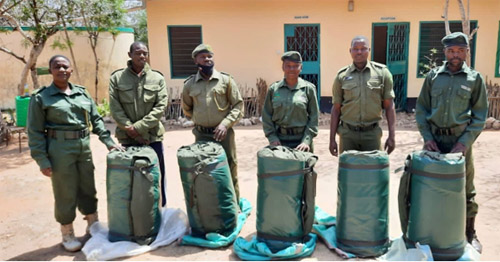
Kasighau Guardians Are Active at the Ranch Working to Promote Human-Wildlife Co-existence. The Kasighau Guardians were alert on their daily duties in January 2022 as they patrolled the semi-arid landscape of Kasighau Ranch when they happened upon 30 logs of acacia trees at Kisima area. Illegal logging is a challenge experienced at the ranch that the Guardians work to tackle. This vice is a threat to the animals utilizing the expansive ranch and it is almost always, the same people who undertake the logging activities who turn out to be poachers. January proved to be a tough month as immense challenges faced in the villages were rife. An incidence on human wildlife conflict was reported by a villager from Ngambenyi where five (5) of his goats were attacked by four (4) cheetahs. The guardians agreed to increase their security patrols on the above-mentioned areas. Similarly, the Kasighau Guardians also received three (3) intelligence reports on poaching activities where three (3) men were seen chasing zebras using lights at night around Kisughunua area. The ambush organized enabled them to find one roll of wire to be used for snaring at Mghongonyi. In February, the gGuardians undertook 21 security patrols and received three (3) incidence reports. Three (3) suspects were arrested with 120 kilograms of bush meat at Katana Dam. The second report revealed that there was logging around Mlima Rubi where they discovered a heap of burning charcoal. Incidences of human-wildlife conflict was reported at Mghongonyi area where elephants destroyed a structure and other properties. The Kasighau Guardians have been a valuable resource to the ranch as well as the communities living near the ranch. They have undertaken the duty of reducing human-wildlife conflict and the community speaks well of them. Animal Welfare Education in Schools Off to a Good Start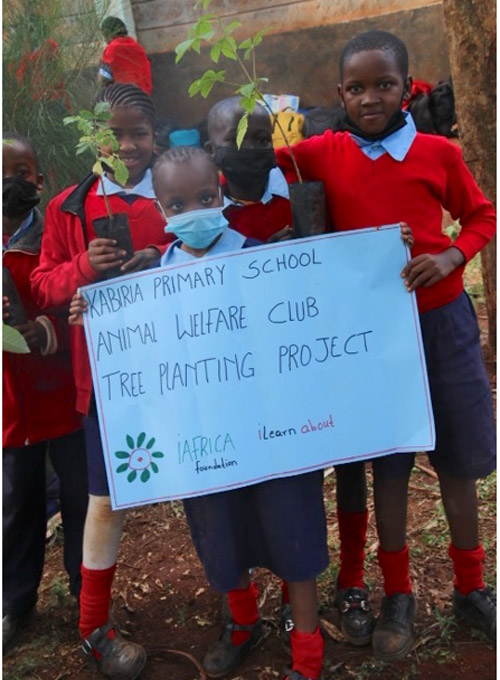
Pupils from Kabiria Primary School Participate in a Tree Planting Activity. The successful iLearnAbout project has been underway as the ANAW team visited Emmanson school to monitor progress. The visiting team also participated in the school’s seedling preparation and transfer, which was a great encouragement to the students. In February, the team visited Naromoru Primary School to take part in a tree planting activity as part of the iLearnAbout project. Support Our Work Here's a great way to support Africa Network for Animal Welfare (ANAW) to protect present and future generations of animals. You can do so through the following ways: A Donation A Legacy in Your Will |
